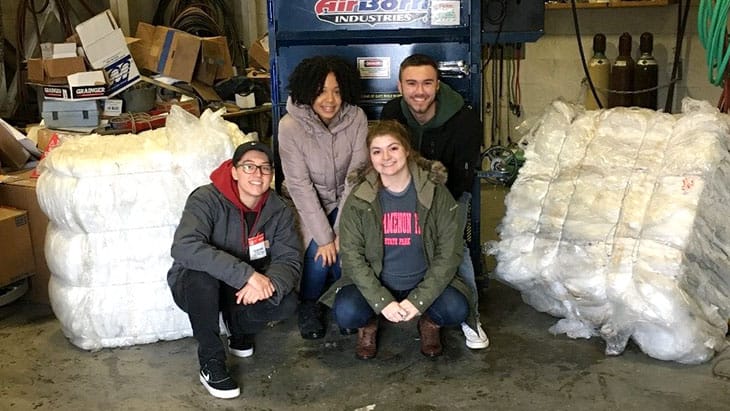CMU is No. 1 in sustainability
U.S. EPA honors Central as 2019 WasteWise College/University Partner of the Year
It started 10 years ago with a little kitchen waste composting, but like food scraps turning into rich soil, that humble beginning set Central Michigan University on a path to national prominence as a leader in sustainability.
The U.S. Environmental Protection Agency has selected CMU to receive its 2019 WasteWise College/University Partner of the Year Award.
This is CMU’s first time in the No. 1 spot nationally, although Central also earned the EPA’s Midwest region Food Recovery Challenge Award each year from 2014-17.
It’s all thanks to CMU’s student-driven culture of sustainability, said Jay Kahn, CMU director of facilities operations. He said the kinds of waste prevention and diversion successes the WasteWise awards recognize don’t spring up overnight.
“What’s really being recognized here is the maturity of our program,” he said.
In 2010, CMU students began a food recovery project that created the first campus compost pile, with the resulting compost given away for use in students’ gardens. The program today composts more than 330 tons of food scraps per year from CMU’s zero-waste kitchens, with the help of food service contractor Aramark and business partner Morgan Composting.
"We're out there using every tool in the toolbox." — Jay Kahn, CMU director of facilities operations
Food recovery is one of many student-led sustainability initiatives. CMU students collect plastic foam, plastic grocery bags and cardboard pizza boxes for recycling. They also collect plastic stretch film — the kind used to wrap pallets of goods — to sell to Petoskey Plastics, which uses the resin to create trash can liners. CMU buys the liners, completing the cycle.

“We’re out there using every tool in the toolbox,” Kahn said. He praised the work of students, community members and business partners that also include Waste Management and the Isabella County Municipal Recycling Facility.
“That’s what makes us a success,” he said. “We realize we belong to a greater community and work diligently to expand that community in everything we do.”
EPA Administrator Andrew Wheeler praised the WasteWise honorees in an award announcement.
“As we begin to celebrate the 50th anniversary of Earth Day, it is fitting to highlight these WasteWise partners for their dedication to waste reduction, environmental stewardship and sustainable materials management,” he said. “These efforts not only provide environmental and cost savings benefits, but they also increase the efficiency of these businesses and organizations, positioning them for greater success.”
In 2018, the year measured for the 2019 awards, the EPA’s 11 WasteWise partners collectively reported preventing and diverting more than 1.9 million tons of solid waste that would otherwise be disposed in landfills or incinerated, saving close to $100 million in landfill tipping fees.
CMU’s waste prevention and recycling in 2018 saved the equivalent of 2,195 tons of carbon dioxide — comparable to removing the emissions of 423 vehicles for one year, saving 224,600 gallons of gasoline or saving the electricity for 347 homes for one year.
Kahn said the EPA award affirms CMU’s stature: “We’re a national institution, and this is just one data point in a long list of national recognition.”





